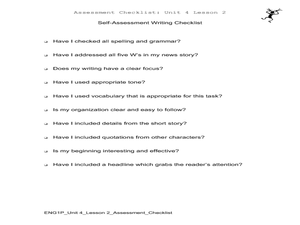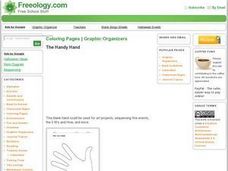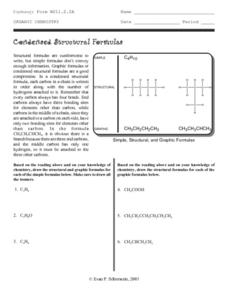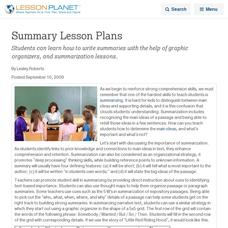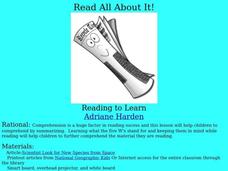Student Handouts
The Five W's and How
Here is a great graphic organizer for ensuring that young researchers and writers cover all their bases when brainstorming a topic by considering the five W's (who, what, where, when, and why) and how.
EngageNY
The Five W’s
Let's take the big W. Scholars analyze the model newspaper article Sandy wreaks havoc across Northeast; at
least 11 dead and look to answer who, what, when, where, and why. They work in groups of three to complete a Five W’s web...
Curated OER
The Five W's
In this graphic organizer worksheet, students answer the five w's in the provided spaces on the worksheet. There are five spaces on the worksheet to fill out. This is ideal to use as a reading comprehension tool.
Bainbridge Class
End of the Year Photo Writing Project
Close out the school year with a look back at a specific event. You provide individuals with photos of themselves, and each pupil fills out the graphic organizer here to prepare for writing a paragraph about the memory depicted in the...
Curated OER
Summarizing with James and the Giant Peach
Elementary readers in literature groups practice summarizing chapter-by-chapter with Roald Dahl's James and the Giant Peach. Focus on main idea, supporting details, and the 5 Ws. Unfortunately, a clever "peach" graphic organizer to which...
Curated OER
Five W's Chart
In this five W's chart worksheet, students fill in a graphic organizer with facts about the five W's: What, Who, Why, When and Where. Chart is for use with interactive white boards.
Alabama Learning Exchange
Who, What, When, Where, Why, How?
Your youngsters are just starting to read texts and pull out important information. Use this graphic organizer with any text to help them practice identifying the who, what, when, where, why, and how of a text. Although the format of the...
Curated OER
Who Am I?
Your budding journalists need to understand the five W's for writing a news story. They read a story, complete several graphic organizers to help them organize and write their article, and then use a self-assessment worksheet to edit and...
Curated OER
Build Mastery: Main Idea
Use a graphic organizer to get readers thinking about main ideas as they record the who, what, where, when, and why of a story. Consider modeling this process completely before kids do this independently. They fill in five boxes charting...
Curated OER
Give 'em a Hand
In this graphic organizer worksheet, students use the shape of the hand to find the who, what, where, when, and why for a text. Students write their answers in the fingers.
Curated OER
Organic Chemistry-Condensed Structural Formulas
In this structural formulas worksheet, students are given three condensed structural formulas and three non-condensed structural formulas. They draw the structural and graphic formulas for each compound.
Curated OER
Summary Lesson Plans
Students can learn how to write summaries with the help of graphic organizers, and summarization lessons.
Curated OER
Read All About It!
Students are taught the comprehensions aids them in their reading and will make reading seem easier once they know what they are reading about. They access how th ask themselves the five W's: who, what, where, when, and why. Students by...
Curated OER
Lesson Ideas for Comparing and Contrasting Content
Here are three lesson ideas to help students learn how to compare and contrast information in any content area
Curated OER
Where are the Electrons?
In this electrons worksheet, students complete a graphic organizer to show the pattern of the principal energy levels, number of orbitals, and electrons in each sublevel of atoms.
Curated OER
Classifying Matter: A Concept Map
In this classifying matter worksheet, students create a concept map to show the relationships between given terms such as elements, matter, substances and solutions.
Other
Freeology: Free Graphic Organizers
Blank templates of all types of graphic organizers from Venn Diagrams to Vocabulary Sketches are available for free at this resource.
Other
Lexiconic Resources: 5 W's and How Chart
This downloadable graphic organizer will assist students in taking notes about a news story. Students will use this resource to identify answers to the following five W's and H questions: What happened? Who was there? When did it happen?...
Enchanted Learning
Enchanted Learning: 5 W's Diagrams
Enchanted Learning provides several examples of graphic organizers that can be used for gathering Who, What, Where, When, and Why information, either for reading comprehension or prewriting. These template suggestions can only be printed...
ClassFlow
Class Flow: Graphic Organizer Five W's
[Free Registration/Login Required] This flipchart is a graphic organizer that helps students identify the 5 W's-- Who- What-When-Where-Why-- and How. This is helpful in summarizing reading selections, historical events and creating news...
Education Place
Houghton Mifflin: Eduplace: 5 Ws Chart [Pdf]
This site from Houghton Mifflin Company provides a simple, reproducible chart to help students gather details of Who, What, When, Where, and Why. This could be used as a reading comprehension tool, or as prewriting for expository writing.
PBS
Pbs Teachers: Story Writing With Arthur
This series of 12 downloadable activities teach students some basics of story writing, using books or videos from the PBS "Arthur" series as a springboard. Activities include creating story maps, asking questions about characters and...







